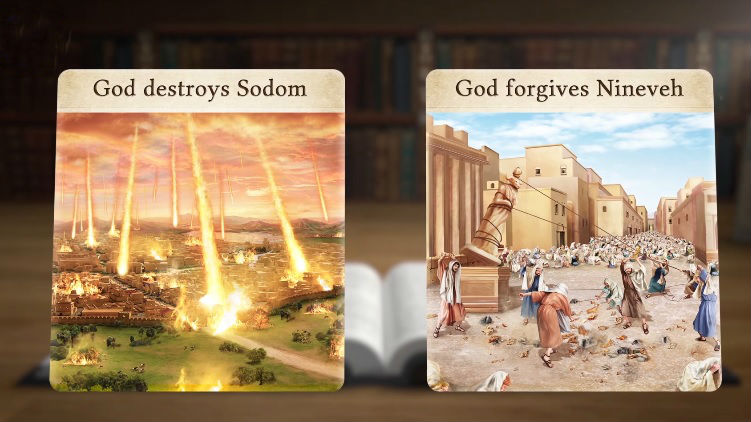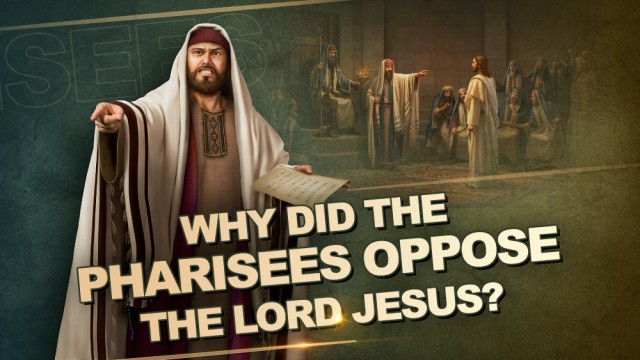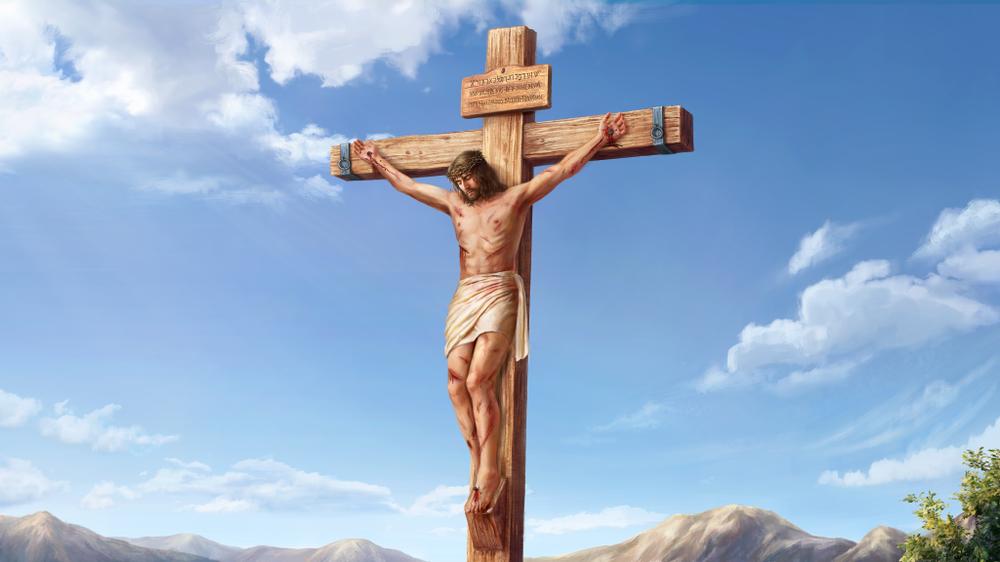Is God Always Merciful and Loving?
The Bible records: “Now the word of Jehovah came to Jonah the son of Amittai, saying, go to Nineveh, that great city, and cry against it; for their wickedness is come up before Me” (Jonah 1:1–2). “And Jonah began to enter into the city a day’s journey, and he cried, and said, Yet forty days, and Nineveh shall be overthrown” (Jonah 3:4). “And Jehovah said, Because the cry of Sodom and Gomorrah is great, and because their sin is very grievous; I will go down now, and see whether they have done altogether according to the cry of it, which is come to Me; and if not, I will know” (Genesis 18:20–21). “Then Jehovah rained on Sodom and on Gomorrah brimstone and fire from Jehovah out of heaven; And He overthrew those cities, and all the plain, and all the inhabitants of the cities, and that which grew on the ground” (Genesis 19:24–25). Without doubt, all those who have read the Bible know that there were two well-known cities in the Age of Law; one was Nineveh and the other Sodom. Both these two great cities had become corrupt to the extreme and were filled with violence, which provoked God’s anger, so that God was going to destroy them. In the end, however, because of the different attitudes of the inhabitants of the two cities, God saved the city of Nineveh and destroyed Sodom. What aspects of God’s disposition can we perceive from these two things done by God? First, let us look at the attitude of the people of Nineveh. When these people heard the news that their city would be overthrown in forty days, their attitude was to repent willingly. As it is written: “So the people of Nineveh believed God, and proclaimed a fast, and put on sackcloth, from the greatest of them even to the least of them. For word came to the king of Nineveh, and he arose from his throne, and he laid his robe from him, and covered him with sackcloth, and sat in ashes. And he caused it to be proclaimed and published through Nineveh by the decree of the king and his nobles, saying, Let neither man nor beast, herd nor flock, taste any thing: let them not feed, nor drink water: But let man and beast be covered with sackcloth, and cry mightily to God: yes, let them turn every one from his evil way, and from the violence that is in their hands” (Jonah 3:5-8). When God sent Jonah to proclaim the message to the people of Nineveh, they believed that God would destroy the city, so they forsook the violence in their hands, turned away from their evil ways, and confessed their sins and repented before God in sackcloth and ashes. Seeing the people of Nineveh truly repent, God changed His heart and spared them from the catastrophe. But the people of Sodom did the exact opposite. It is written: “But before they lay down, the men of the city, even the men of Sodom, compassed the house round, both old and young, all the people from every quarter: And they called to Lot, and said to him, Where are the men which came in to you this night? bring them out to us, that we may know them” (Genesis 19:4-5). When the two angels sent by God came to the city of Sodom, not only did the people in it not stop their evil deeds, but they were more evil than ever, attempting to harm the two angels. Their evil deeds of resisting God finally provoked God’s anger, and they were destroyed by brimstone and fire from God.

Some people might say, “Sodom and Nineveh were both evil cities in God’s eyes; why did God spare Nineveh but destroy Sodom in the end?” The words expressed by God have revealed this mystery to mankind. God said: “Regardless of how angry God had been with the Ninevites, as soon as they declared a fast and donned sackcloth and ashes, His heart began to soften and He began to change His mind. When He proclaimed to them that He would destroy their city—the moment prior to their confession and repentance for their sins—God was still angry with them. Once they had carried out a series of repentant acts, God’s anger for the people of Nineveh gradually transformed into mercy and tolerance for them” “Why did God want to burn this city so thoroughly? What can you see here? Could God really bear to watch mankind and nature, His own creations, be destroyed like this? If you can discern Jehovah God’s anger from the fire that was cast down from heaven, then it is not difficult to see how great His rage was, judging by the targets of His destruction and the degree to which this city was annihilated. When God despises a city, He will deliver His punishment upon it. When God is disgusted with a city, He will issue repeated warnings to inform people of His anger. However, when God decides to put an end to and destroy a city—that is, when His wrath and majesty have been offended—He will deliver no further punishments or warnings. Instead, He will directly destroy it. He will make it utterly disappear. This is God’s righteous disposition” (“God Himself, the Unique II” in The Word Appears in the Flesh). From God’s words, we can see that both Nineveh and Sodom were deeply corrupt cities, but God took different attitudes with them according to their respective attitudes toward God. God’s disposition is righteous and holy, so He has His principles in treating mankind! The people of Nineveh could receive God’s salvation because they truly repented in sackcloth and ashes, from which God’s disposition of mercy and lovingkindness and tolerance can be seen. As long as people sincerely turn to God, God will forgive their transgressions, gracious toward them once again. The people of Sodom were destroyed by God in the end because they never repented but stubbornly opposed God to the very end, from which we can see God’s righteous disposition of majesty, wrath, and intolerance of man’s offense. No matter how merciful God is toward mankind and how concerned He is for mankind, if any people openly compete with Him and oppose Him with no signs of repentance, they will be punished by Him! Just as God’s word says: “God’s thoughts are in a state of constant transformation according to changes in things and in environments. While these thoughts are transforming, different aspects of God’s essence are revealed. During this process of transformation, at the precise moment when God has a change of heart, what He shows to mankind is the real existence of His life, and that His righteous disposition is full of dynamic vitality. At the same time, God uses His own true revelations to prove to mankind the truth of the existence of His wrath, His mercy, His lovingkindness, and His tolerance. His essence will be revealed at any time and any place in accordance with how things develop. He possesses a lion’s wrath and a mother’s mercy and tolerance. His righteous disposition allows no questioning, violation, change, or distortion by any person” (“God Himself, the Unique II” in The Word Appears in the Flesh).
Today in the last days, the Lord Jesus has become flesh again in the deeply corrupt human world, and by expressing words under the name of Almighty God, He has carried out the work of judgment beginning with the house of God, fully revealed the mystery of God’s management of saving mankind, and opened the sealed scroll in Revelation. In the last days, Almighty God has expressed all the truths required for man’s salvation to purify and transform man and reveal to man God’s disposition of righteousness, majesty, and intolerance of offense and His holy substance, so that through experiencing God’s judgment and chastisement, man can cast off his corrupt disposition and break free from Satan’s influence completely and be taken by God to a wonderful destination in the end. With the spread of the kingdom gospel of Almighty God, many true believers in the Lord who longed for the appearance of God have returned before God’s throne, received the supply of God’s words, recovered their former faith in God, and stepped onto the path to salvation. But there are also many other believers who, when faced with the work of Almighty God—the returned Lord Jesus—in the last days, do not seek or investigate it, but resist and condemn it because of listening to the words of their pastors and elders blindly. What is more, the pastors and elders in the religious world frenziedly resist Almighty God for fear that they will lose their positions and jobs if the believers all follow Almighty God’s work in the last days. They also stop the believers from investigating the true way by spreading rumors against it everywhere, and they even instigate them to call the police to arrest the brothers and sisters of the Church of Almighty God, thus making them Judases betraying the Lord and their true friends. They attempt to expel the incarnate Christ of the last days from among man in order to satisfy their aim to control God’s chosen people forever. Not only this, but they, when hearing some believers raise objections to their instruction, say with unbridled arrogance, “The Lord Jesus is merciful and loving. I believe that He will not forsake me when He comes. Everything I do is to protect His flock, and the Lord knows my heart. You just do what I’ve told you. If there is retribution, let the sin of condemning Almighty God be visited upon me.” It seems as if we heard the Pharisees who resisted the Lord Jesus 2,000 years ago crying to nail the Lord Jesus to the cross again, “His blood be on us, and on our children” (Matthew 27:25). These people think that God is merciful and tolerant toward man and that they are the lucky ones and all their sins will be forgiven by God. When they hear the news that the Lord has returned to do the work of judgment and chastisement, they are deaf to it, and they do not make any effort to seek or investigate it, and they even fabricate rumors to condemn God, becoming His opposers.
The inherent disposition of God is righteousness, majesty, and wrath, which is like the disposition of a lion and not that of a lamb. If we, not knowing God’s disposition, define God as a merciful and loving God who will forgive and pardon our sins no matter how fiercely we are hostile to Him or condemn and resist Him, then we are terribly wrong. What kind of people does God have mercy on? What kind of people does He hate? This is the truth that all believers in God should understand. God said: “God’s treatment of the whole of humanity, foolish and ignorant as humanity is, is primarily based on mercy and tolerance. His wrath, on the other hand, is kept concealed for the vast majority of time and in the vast majority of events, and it is unknown to man. As a result, it is difficult for man to see God express His wrath, and it is also difficult to understand His wrath. As such, man makes light of God’s wrath. When man faces God’s final work and step of tolerance and forgiveness for man—that is, when God’s final instance of mercy and His final warning comes upon mankind—if people still use the same methods to oppose God and do not make any effort to repent, to mend their ways and accept His mercy, then God will no longer bestow His tolerance and patience upon them. On the contrary, God will retract His mercy at this time. Following this, He will only send forth His wrath. He can express His wrath in different ways, just as He can use different methods to punish and destroy people” (“God Himself, the Unique II” in The Word Appears in the Flesh). From God’s words, we can see that although God’s wrath is concealed and unknown to man, God does not tolerate man’s offense. When people are hostile to God and resist and oppose God repeatedly, God’s wrath will be displayed to them. Yet when people sincerely repent, God will bestow His tolerance and mercy upon them once more. Facing God’s work of the last days, we have two choices: either to go on believing the rumors against it and slander and condemn it blindly, to sin against God and offend God’s righteous disposition, which will cause us to be destroyed by God like the people of Sodom, or to abandon the violence in our hands and turn away from our evil ways like the people of Nineveh, which means repenting sincerely before God and accepting God’s new work in submission. What is your choice? Without doubt, you, a smart person, will make a smart choice after weighing it!





